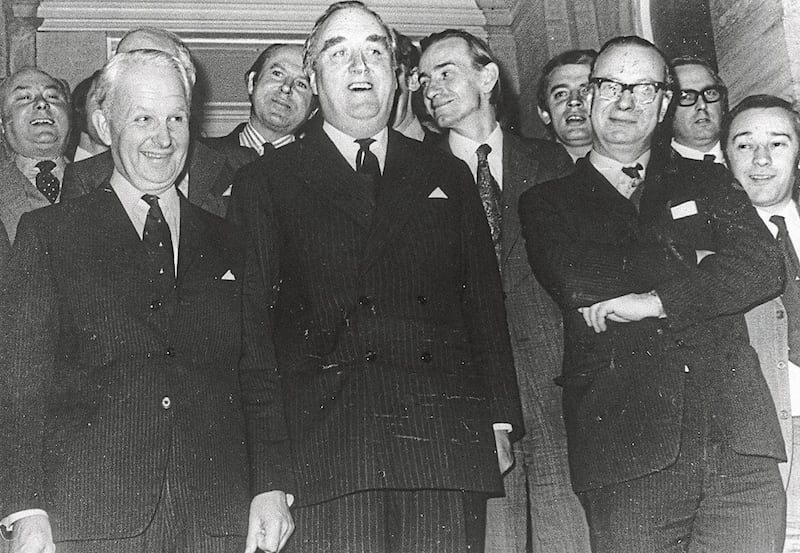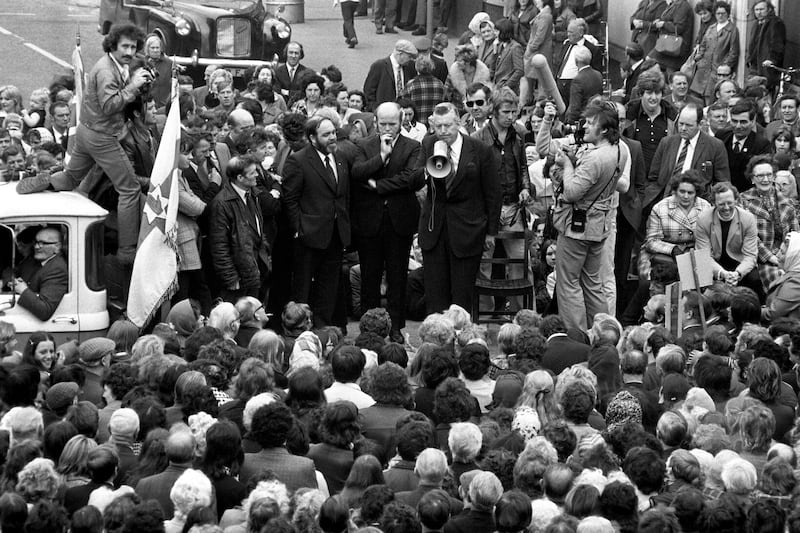At 6pm on Tuesday May 14 1974, an amended motion tabled by Brian Faulkner (which called upon the Assembly to endorse the Sunningdale Agreement and ‘the letter and spirit of commitments entered into by the British and Irish governments’) was passed by 44 votes to 28.
A few minutes later, a member of the Ulster Workers’ Council walked into the press room in Stormont and told journalists that, as a consequence of the vote, electricity workers would begin the process of reducing supply across Belfast to the extent that industry would be forced to shut down.
At that point the general view of both the media, the pro-Sunningdale parties (Faulkner’s wing of unionism, the SDLP and Alliance), along with the two governments, was that the UWC statement was mere bluster. After all, there had been an assortment of stoppages, protests and half-hearted strikes since the rumours about the possible prorogation of the NI Parliament began to circulate three years earlier in the autumn of 1971. So, the expectation was that this ‘strike’ would be another one-of-the-usual one-day wonders.

Even the full-page advertisement in that day’s News Letter by the United Ulster Unionist Coalition didn’t seem to raise concerns: “If Brian Faulkner and his colleagues vote… to support Sunningdale then there will be a general stoppage. Workers’ dependents are advised, in such an event, to apply for Supplementary Benefits immediately. Advice centres will be available in all areas. After 6pm all essential services will be maintained, and only action by Mr John Hume will rob the housewife, the farmer and essential services industries of power.”
What was being proposed by the UWC and UUUC (with on-the-ground muscle from the UDA and other loyalist paramilitarism) was, to all intents and purposes, a revolution: an orchestrated attempt to overthrow the government of Northern Ireland. Moreover, a government whose authority and policies were underpinned by the sovereign parliament of the United Kingdom. How could it hope to succeed? Could it even be allowed to succeed?
- Alex Kane: 50 years on, has anti-agreement unionism come up with an alternative?Opens in new window
- How Britain learned the lessons of the collapse of Sunningdale in 1974 – Alex KaneOpens in new window
- Sunningdale Agreement at 50: Why the first major attempt at power-sharing was too-much, too-soon for unionistsOpens in new window
What Westminster hadn’t reckoned with was the lessons that the ‘revolutionaries’ had learned from what had been happening across Great Britain in the previous months. The Trade Unions Council (the TUC) had been orchestrating huge waves of disruption against the Conservative government’s Industrial Relations Act – often with tacit support from Harold Wilson’s Labour opposition. Edward Heath had been forced to introduce a three-day working week and both power and essential supplies were restricted. Mass disruption was changing the face and nature of British politics.
Eventually Heath was forced to call a general election in February 1974, what became known as the ‘Who Governs Britain’ election: “This time of strife has got to stop. It’s time for you to speak with your vote. It’s time for your voice to be heard. It’s time for you to say… we’ve had enough. There’s a lot to be done. For heaven’s sake, let’s get on with it.”

On the back of that message, the UUUC mounted its own election campaign: in essence, asking unionists to pass their judgement on the Sunningdale Agreement.
It was actually a brilliant campaign and certainly much better than Heath’s. The UUUC won 11 of the 12 parliamentary seats and a slim overall majority of the votes cast. It had achieved an anti-Sunningdale, anti-Faulkner mandate. It had proved it represented not only the majority of unionists but, more important, the majority of voters in NI.
It was a hammer-blow to Faulkner and the new executive. The sort of hammer-blow some within the UUP (the largest party within the UUUC) hoped would persuade Faulkner to row back a little, or else pressurise some of his assembly representatives to switch sides and join the UUUC within the assembly.

But Faulkner and his assembly group pressed on. Perhaps they believed that the UUUC would never go as far as a revolution, or maybe – and there is some evidence for this – that the UUP, the party to which they had all previously belonged, would not want to be associated with loyalist paramilitarism and the possibility of clashes with either the RUC or army.
But the UUUC had learned the most important lesson of the ‘Who Governs Britain’ election. Heath had lost. It made the assumption, a fairly safe one as it happens, that if it became a clash between it and Faulkner about who governed Northern Ireland, then Faulkner would be on the losing side: not least because he, too, had lost his mandate at the general election.

The anti-Sunningdale mandate was key to pressing ahead with the strike. It’s hindsight, I know, but I don’t think the UUUC would have agreed joint action had it not secured an overall majority of the votes cast.
William Craig, leader of Vanguard during the strike, told me during the 1979 general election that he didn’t think the UUP would have agreed to the ‘sort of strike we saw’ in the absence of that majority. And that’s because it wasn’t just a challenge to the NI Assembly, but also a challenge to Westminster and Harold Wilson’s new government.
Some people within the UUP, Vanguard and the UDA also told me – years later – that Ian Paisley absented himself from Northern Ireland at the start of the strike because he wasn’t sure how it would play out in those early stages.

The reality, of course, was that at 6pm on May 14 nobody had a clue what was coming down the track: not the executive, not Westminster, not the media, not the UUUC, not the people of NI, not the security forces or intelligence services. No-one. Not even Alex Kane, who was busy preparing for A-Level examinations and with no certainty if or when he would be sitting them.
It was the beginning of the most significant political/constitutional crisis in Northern Ireland’s history. And the biggest challenge by ‘Ulster’ unionism to Westminster policy since 1912. The risks for both sides were huge.










